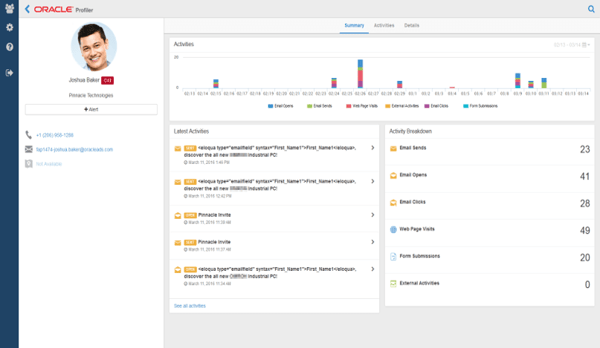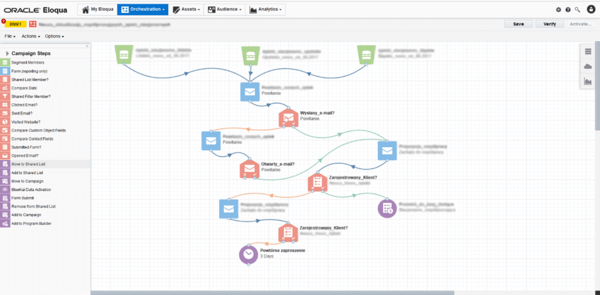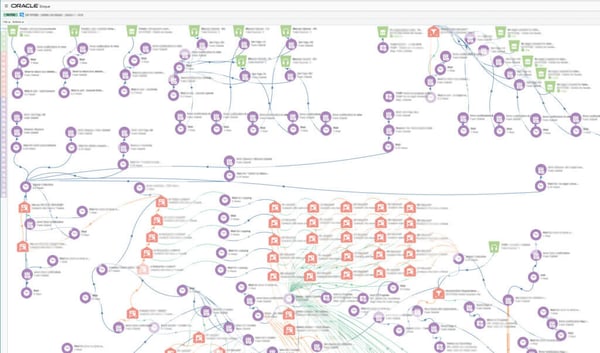Oracle Eloqua, an advanced marketing automation platform
Eloqua - co to takiego i dlaczego to najlepsze na rynku rozwiązanie Marketing Automation?
Eloqua is nothing less than the most advanced marketing automation system on the market. We can find this out by analyzing independent and reliable sources such as Gartner or Forrester naming Oracle's marketing automation solution as #1 in the world.
From this guide you will learn:
- What are the most important features of Eloqua
- What you can use Eloqua Marketing Cloud for
- What are the capabilities of this system in combination with other business tools
- What you should think about before implementing a Marketing Automation system
However, if we want to make sure the rankings are reliable ourselves, it is best to find out by checking how well the Eloqua marketing automation system is able to meet our various needs. To do this, we should prepare the most comprehensive list of our business requirements in the marketing automation area, including not only our current needs, but also what we would like to implement in the future. If it is difficult for us to generate such a list, we can always use the help of an experienced Oracle Partner specializing in Oracle Eloqua Marketing Cloud implementations, especially the Eloqua system, who will be able to point out specific possibilities of applying marketing automation in our company. Having such a list, we should check to what extent our requirements can be met by the Eloqua system and to what extent by competing systems. Business practice indicates that for most or all cases of complex needs, the capabilities of the Eloqua system are clearly superior to those of competitor solutions. For simple applications or low expectations, the systems may be comparable and more relevant to actual business needs.
Eloqua - licensing
Oracle Eloqua licensing model is based on the number of contacts in the database understood as the number of email addresses and the range of available functionality, which means that no additional fee is charged depending on the amount of correspondence sent.
Eloqua comes in 3 basic variants: basic, standard and enterprise. It is also possible to choose one of the variants of the Eloqua marketing automation system dedicated to a specific industry, the so-called verticals, and if there is a need to expand the functionality of the 3 basic variants, to add additional features to them, the so-called ad-on.
If you need to decide which version of Eloqua is right for your company, it is best to seek the help of an experienced Oracle Partner specializing in Oracle Eloqua Marketing Cloud implementations, who will already be able to determine which of the variants will be right for your company based on a preliminary needs analysis.
Eloqua - basic functionalities
Like most marketing automation systems, Oracle Eloqua Marketing Cloud is characterized by a number of features necessary for the application of automation in marketing. These include:
- Digital Body Language, i.e. the ability to record on the customer's profile all his activities relevant from the perspective of our company, to which we as a company have access
- advanced Lead Scoring, or the ability to set up multiple scoring models for different products, services or groups according to varied criteria
- possibility to build advanced and dynamicmarketing campaignsbased on a variety of data and customer behavior
- email marketing
- possibility to create and use emails with dynamic content
- possibility to create and use landing pages with dynamic content
- dynamic forms
- possibility of combining campaigns with social media
- possibility to divide processes into functional areas of the company, divisions or independent business units in particular countries
- tools and possibilities for development, modification using general software tools
- and many, many more...
The list of functionalities and possibilities in the case of Eloqua is very long, but after analyzing various marketing automation systems we find that at such a general level of description most of the systems have very similar functions, that is, the basic question arises how do they really differ if they can do more or less the same thing?
Well, the answer lies in the details, i.e. how the functionalities in question are implemented, to what extent we have the ability to adjust them to our needs and to what extent it is we who have to adjust to the solution, and how we can manage the acquired data.
Example:
All systems for sending emails use an IP address, but the key is whether it's one general address used by the system for all or most of the mailings carried out, or whether there is the possibility of granting our company an individual IP address or several IP addresses, if necessary, which, in conjunction with the proper management of the contact database at the level of our company, is absolutely key to achieving the right level of email deliverability (send emails any system can do - the question is how many of them actually reach the addressees)

Eloqua - Oracle Market Place
Another characteristic of Eloqua is the ability to take advantage of a large number of additional functionalities provided by applications available directly from the Eloqua system. Many of them are free of charge and since they are generally already integrated with Eloqua to use them you usually only need administrator privileges to connect the application.
Eloqua - integration capabilities
Oracle Eloqua Marketing Cloud is a system with strong integration capabilities with a variety of databases. Since Eloqua was and is a solution used by large CRM solution providers, standard integration with most CRMs is not a problem and in practice Eloqua integration is possible with basically any database that allows access to data.
When choosing a marketing automation solution for your company, it's worth checking what opportunities for integration with various databases the system you're considering has, and you should take into account not only the current state (e.g. only integration with currently used CRM), but also what may happen in the future - by implementing and then using (we're talking about actual and effective use) the opportunities of the marketing automation system we will gain more knowledge and skills, and with them our ideas and needs in the area of marketing automation will grow. Over time, it will turn out that we would like to implement new campaigns based on data that we did not have at the time of implementation, or that appeared on the market as possible to use. It will then turn out that we should integrate the marketing automation system with further databases or data sources, and if the solution we are using is not flexible in this area we may have a problem with further development of marketing activities. Checking the capabilities of various marketing automation solutions available on the market regarding integration, it will turn out that some of them will not meet our requirements in this area, and it may be worth ruling out their use already at this stage for this very reason.
Eloqua - what data we can use
As we mentioned previously, Eloqua is a system that has very strong integration capabilities, thanks to which, in principle, there are no major restrictions on the possibilities of using data. We can use both the data collected directly in Eloqua, the data we have e.g. through integration with CRM, and the data entered into Eloqua on a one-time basis or in a built cyclic process of data exchange with other systems or databases.
In addition to this, Eloqua has a very important functional layer that allows building even complex data programs that can process the information you have or acquire into the formats needed during marketing campaigns.
Eloqua - Oracle Marketing Cloud infrastructure
Eloqua is part of a large environment known as the Oracle Marketing Cloud, within which there are further applications integrated with Eloqua that allow, in the event of increasing needs at the company level, to extend the functionality that you have. Oracle Marketing Cloud is an environment constantly developed by Oracle, so if we decide to implement the Eloqua system in our company, we are sure that both the system itself and its environment will develop along with the ever-changing trends in digital marketing, which guarantees that we will be able to implement in the future even those ideas we haven't thought of today.
Eloqua - effectiveness of marketing automation vs. quality of content
Content in the case of marketing automation, regardless of the solution implemented, is crucial to the results achieved through marketing campaigns. The same is true for the Eloqua system. Even the best thought-out and implemented marketing campaign will not work well if we do not feed it with the right content. It's easy to find out by running identical campaigns on a test basis, but with different content delivered to our customers. In both cases, despite using the same tool and identical campaign logic, we will most likely get different results. It is worth keeping this in mind when preparing for implementation or during the preparation of the first campaigns.

Eloqua - how Oracle Eloqua Marketing Cloud can be used for RODO requirements
Eloqua meets the security criteria associated with the requirements of RODO, but regardless, it has a number of functionalities that can solve emerging issues in more than one company.
First of all, it has a very flexible data access permission management module. In fact, at the company level, it allows us to build any matrix of permissions ranging from the broadest at the admin level to very narrow ones allowing only access to one function or even a limited scope of a single function.
It also has the ability to broadly manage marketing consents and create a company-specific "preference center" that allows customers to grant consents in the area of interest.
In the case of the need to manage the entire area of RODO at the company level, an experienced Oracle Partner specializing in Oracle Eloqua Marketing Cloud implementations is able to prepare the system to meet all the needs of a given company or industry.
Eloqua - what to think about before implementing a marketing automation system
It often happens that the idea of implementing a marketing automation system as a useful tool comes up, but at the company level it is hard to find an answer to the question of what specifically it should be used for and how the company should prepare for it.
It is worth emphasizing that each of the marketing automation solutions is ultimately better or worse software that a company can use, but none of the solutions by itself will produce results without the work and commitment of those responsible for its use.
Before implementation, it is necessary to define the goals we want to achieve, that is, to determine what we want to use marketing automation for. This will allow us to think about the processes that already exist within the company, or those that we will need to prepare and implement to ensure that we meet our goals. With knowledge of the processes, we should agree on what data we will use in them, which will allow us to determine the type and method of integration of the Marketing Automation system with internal or external data sources (e.g. CRM, Call Center system, etc.).
For effective use of the system it is also necessary to know who our customer is, i.e. to define the so-called Buying Persona and in the next step to create the so-called "Customer Journey Map", i.e. the path our customer usually follows during the process of choosing a product or service, in order to understand at which moments we should reach him with the right information for a given persona.
Here, of course, another question arises - do we have the right content (content) for different personas located at different moments of the "Customer Journey"? The process of mapping the content we have to Buying Personas and to their Customer Journeys is helpful in answering this question.
There are, of course, more pieces of the puzzle, but above we wanted to point out at least a few basic ones while emphasizing that proper preparation for the implementation of marketing automation is the key to later success.

Eloqua - the ability to use a single instance in several countries while maintaining secure access to the database for a limited number of users
Eloqua as a system is prepared to handle large customer bases regardless of whether they are located in one or several countries.
There are two basic ways to use the Eloqua marketing automation system to serve the needs of a company operating in multiple markets in multiple countries:
- Purchasing the Oracle Eloqua Enterprise Cloud version, which, both in terms of the number of system access licenses and the ability to use separate Oracle Eloqua instances in different countries in practice, is prepared to support companies in international markets Purchasing another version of Eloqua, e.g. Oracle Eloqua Standard Cloud, on which an experienced Oracle Implementation Partner will be able to adjust the system in terms of customer requirements.
If the need arises, the Eloqua marketing automation system allows you to build a digital marketing competency center and achieve, in the medium term, increased consistency, efficiency and speed of marketing activities with their high adaptation to national markets or even specific segments in those markets.
Eloqua - interesting information
If you are interested in material about Eloqua, we encourage you to follow our blog, where we will periodically post more information, details, descriptions and interesting facts about Oracle Eloqua Marketing Cloud.
However, if you need information right now - please contact us – we are able to answer any question about this solution or if you are already using Oracle Eloqua Marketing Cloud help you to use it effectively.




